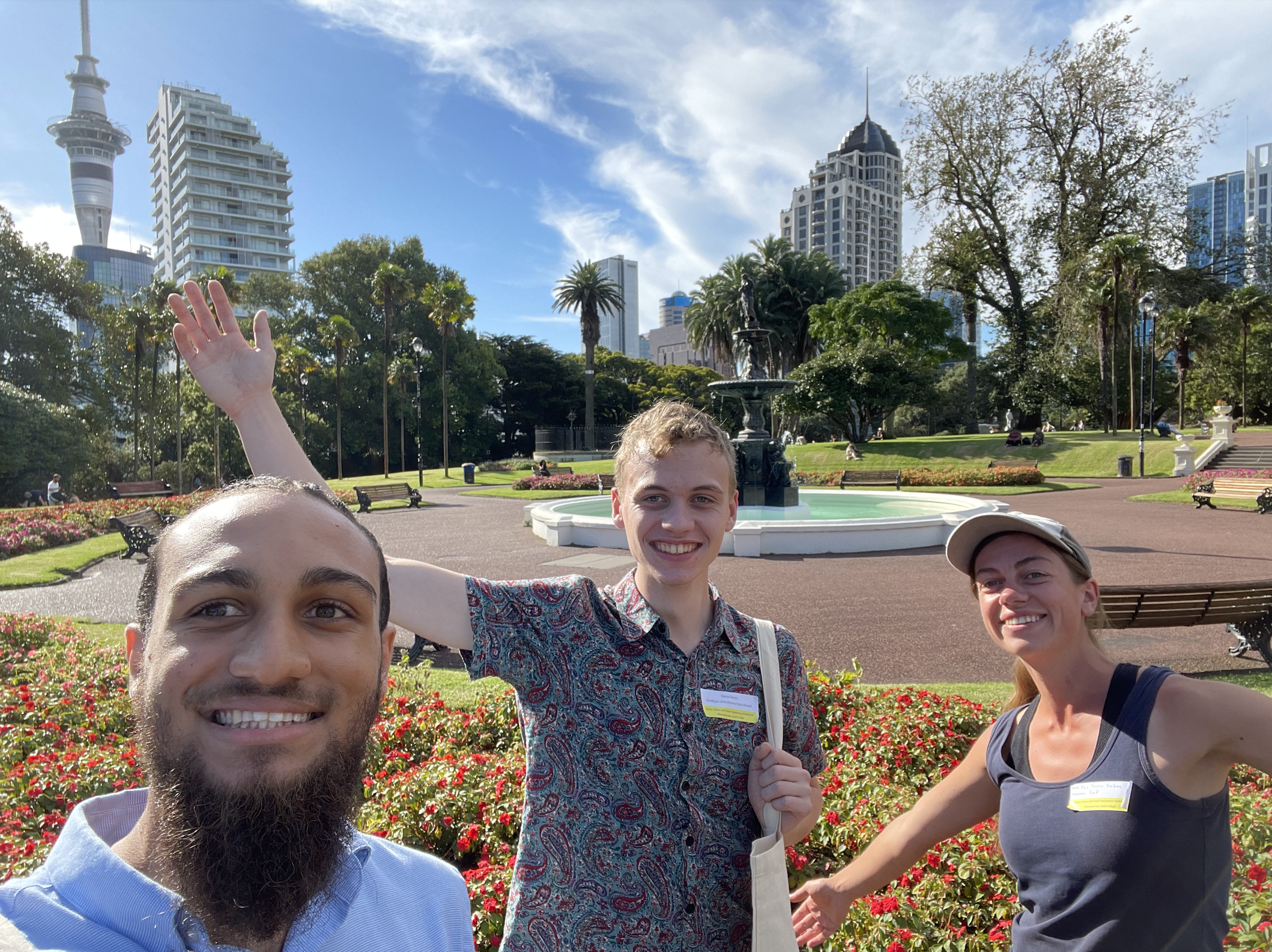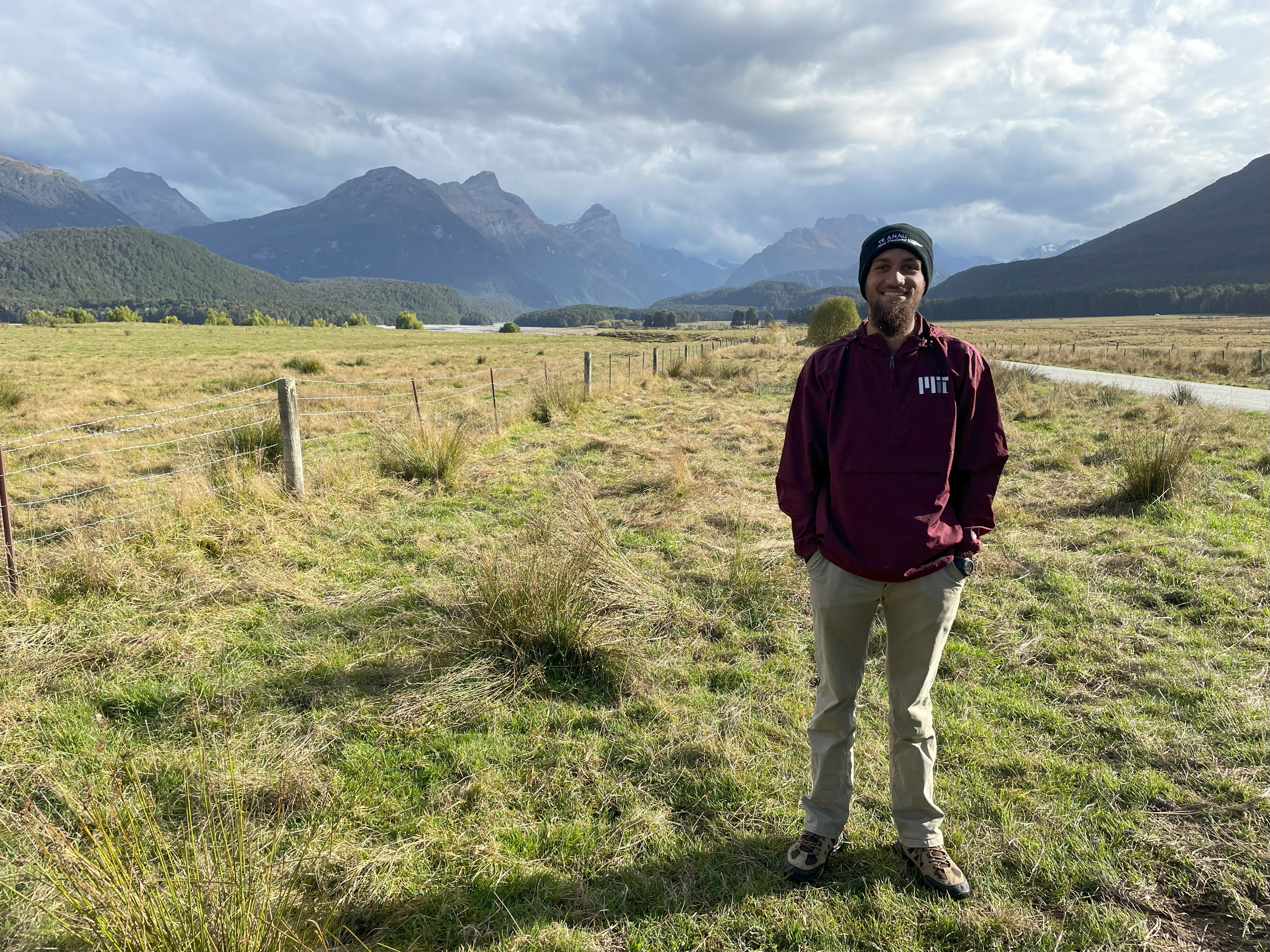- May 31, 2024
- Amanda Soh
Q&A with Derek Allmond '24 - MISTI Excellence Award Winner
Derek Allmond spent six months in New Zealand back in 2023—it was his very first time traveling out of the US! He took classes on the Māori language and culture during his study abroad at the University of Auckland in New Zealand. He extended his stay to do a MISTI research internship on sustainability and agriculture.
MISTI: How long was your MISTI program in NZ? What was your research on?
Derek: Two MISTI programs that I did were in New Zealand, where I studied abroad at the University of Auckland, and then stayed on at the university to continue with research work. I did a total of six months.
MISTI: What will you go on to do after graduating?
Derek: I found myself extremely interested in remote sensing processes, which was what my research at the University of Auckland was on. More specifically, it was on sustainable agricultural processes. I've been trying to find some work or research opportunities that I can continue doing, using some of those remote, sensing style, methods, and sustainability.
MISTI: Why did you choose to study abroad and intern in New Zealand?
Derek: I started taking classes in Māori language and culture, and then also some on the Pacific Islands just to expand my horizon because I wasn't familiar with that specific part of the world and the people that live there. It really opened my eyes.
I'm really fascinated with all aspects of sustainability and climate science. Over the last few years, I was becoming very interested in sustainability and agriculture. After speaking with my MISTI New Zealand program director, we talked about potentially staying on for an extra couple of months if I could find some research work that I'd be interested in. I found that Dr. Mark Jeunnette, Director of Engineering Design, Department of Engineering at the University of Auckland, was trying to start up a project on remote sensing applications for agriculture in the Pacific islands.
My projects included preliminary work for Dr. Jeunnette’s future remote sensing endeavors in the Pacific Islands, analysis of aerial imagery and data collected from Uganda, and the implementation of machine learning to automate field delineation processes. With regard to Dr. Jeunnette's Pacific Islands work, I was able to assist in establishing a network of connections both within the university and externally. For the Uganda data analysis, I helped Dr. Jeunnette with data visualization and assisted in finding anomalies and errors in the data that occurred during the data processing phase.
MISTI: How did your internship experience help you understand the global landscape of your field of study or work?
Derek: One of the two main things that I took from my experience in New Zealand is that they're leaps and bounds ahead as far as conservation efforts and climate change principles go.The second thing is that a lot of my work dealt with climate change in developing communities. This experience really opened my eyes to how much climate change is an all intensive and all expansive across all nations. Some nations need more help than others in addressing these issues, and others are at the receiving end of these issues. This really put into perspective how this should be an all-encompassing issue that we need to be aware of, not only for ourselves in the United States, but as part of the world. Everyone needs to do their part in looking out for others on an international scale.

MISTI: Were there any cultural differences you noticed?
Derek: The difference in jargon that some of my academic peers used. One example was when we talked about classes or courses, a lot of students would refer to them as “papers.” I wasn't used to that but it didn't take much getting used to.
MISTI: In your opinion, do you think international exposure is important for students?
Derek: I think international exposure is a really important tool for students to utilize at MIT, if they have the opportunity to do so. Not only can you use this to expand your network on a national scale, but internationally too. You also learn how other countries are tackling issues that we face locally and observe how they're addressing them. The opportunity to see how they work and then apply techniques to solve the issues gives you a different mindset overall.
MISTI: What advice would you give to a student considering opportunities abroad?
Derek: I was very nervous before leaving because I hadn't actually been out of the country before, so that was completely new to me. But I would just say, take the leap, because in the end, it's all worth it.
I would also just be open and considerate to the people you meet abroad. If someone does or says something different from what you're used to, try not to approach it from a negative standpoint. I would give them the benefit of the doubt, and just be open with them.
MISTI: What would be that one environmental issue you would like to change and how will you go about bringing that change?
Derek: There's a lot of environmental issues that I'm passionate about. Of course, the most current one that I would like to specifically address would be the replacement of carbon-intensive methods of electricity generation with renewable and carbon-free energy sources.
Addressing carbon emissions from electricity generation is definitely a colossal undertaking. So, it’s not something that I would be able to change by myself. The one step I would like to contribute to is informing the public and policy makers about viable options. There is a lack of knowledge in the general public about this issue. We have a lot of research and data that show that some other methods are more viable than existing coal and gas natural gas plants.
